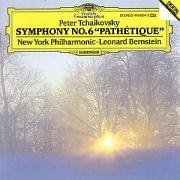| All Artists: Pyotr Il'yich Tchaikovsky, Leonard Bernstein, New York Philharmonic Title: Tchaikovsky: Symphony No.6 (Pathétique) Members Wishing: 0 Total Copies: 0 Label: Deutsche Grammophon Release Date: 10/25/1990 Genre: Classical Style: Symphonies Number of Discs: 1 SwapaCD Credits: 1 UPC: 028941960429 |
Search - Pyotr Il'yich Tchaikovsky, Leonard Bernstein, New York Philharmonic :: Tchaikovsky: Symphony No.6 (Pathétique)
 | Pyotr Il'yich Tchaikovsky, Leonard Bernstein, New York Philharmonic Tchaikovsky: Symphony No.6 (Pathétique) Genre: Classical
|
Larger Image |
CD DetailsSimilar CDs |
CD ReviewsControversial and maybe flawed, but original conception John Grabowski | USA | 04/15/2005 (4 out of 5 stars) "I have to give Lenny an A+ for originality, even if I don't agree with a number of the things he does on this CD. At least he's rethought the music, and contrary to what lesser-observant reviews below say, it's not *all* about slower tempi. He brings out the counterpoint and the rich appoggiaturas that usually get underplayed or swallowed in the lush wall of sound. The details that emerge are interesting and educational. And I have a confession to make: I used to hate hate hate this CD. I held it up to ridicule as everything that's wrong with Bernstein. Now that classical maestros have gotten blander and blander, turning out identical, perfunctory, intellectually-lazy readings of the repertoire, the recording holds up much better, though I'm still not completely ready to drink the Kool Aid. Bernstein approaches the first movement as a war between two themes or ideas or moods--the troubled first theme, which starts out tentatively and retreats, only to explode in volcanic fury and be extinguished, and the second theme, which is the more "feminine" theme that is very unsteady the first time around, and stronger and more self-assured in the recapitulation. Just listen to the two different ways Bernstein handles this theme--he's clearly thought this symphony through carefully, whether you agree with his conclusion or not. I rather like his way with the first movement very much, with one notable exception: in the transition between the bombastic first theme and the return of the more floral second theme, there is a passage where the violins play a phrase and the trombones answer it and the violins play the phrase again lower and the trombones answer lower, etc. I'm writing this at work (don't tell my employer!) and don't have the score with me, but on the CD this starts at 15:24. I feel Lenny drags this out beyond what even he can coax from it. But at the same time, note the tentative way--and how the intensity builds from there--that the second theme then returns. At around 17:50 onward you really hear it gathering steam, and the return is not just a note-for-note recapitulation but a real *reason* for having the music come back. The 5/4 "waltz" has always fascinated me, not so much for the odd first theme, but for the second theme. For, maybe it's just me, but here I find the real spine of this whole work--and it's odd for the "B" theme of the second movement to be the place where some of the most important music takes place, but I feel that it does. This brooding theme seems to hide a secret, a revelation if you will, and it ties very interestingly into the last movement. (The last movement's main theme is a variation of it, really.) Lenny's handling of the coda in that last movement is simply devastating, the finest I've heard, convincing me, despite some flaws, that this is a great reading. Another of those flaws is an overexaggerated and slow reading of the climax of the finale--at 10:59 in the last movement. As with the descending trombone passage earlier, I don't think the music can stand that much weight. Some other nitpicks are the really ratty and raw brass of the NYPO. I've never liked the trumpets of this orchestra. A reviewer once described them as sounding like independent contractors and I think he hit it right on; they never sound integrated into the rest of the orchestra, and they sure don't here. This is a flawed disc, though not as so as the nay-sayers would have you believe. (Would they bat an eye if Lenny conducted Mahler with these extremes in tempo and dynamics? No, they'd applaud it. "But Tchaikovksy shouldn't be dealt with the same as Mahler!" --Says who?) However, Lenny's large-scale vision, his unique interpretation (did we really need another middle-of-the-road Pathetique from DG?) makes this is a top recommendation anyway. My favorite Tchai 6th remains Mravinsky on DG, which achieves much the same conviction without Lenny's excessiveness, but this holds a worthy place on my shelf. I recommend it, though not without reservation and not as a prime choice, but as an alternative way to hear what is probably Tchaikovsky's greatest work." Ultra-Controversial Recording Of A Popular Work Erik North | San Gabriel, CA USA | 11/27/2004 (5 out of 5 stars) "Undoubtedly one of the most influential and emotional conductors of the 20th century, particularly in his final fifteen years of life, Leonard Bernstein was also, not surprisingly, the target of controversy during those final years as his conducting tempos got gradually slower and his conducting style became ever more flamboyant. Probably no recording he made during those final years has engendered as much debate as this live 1986 recording of Tchaikovsky's 6th Symphony (the "Pathetique"). The final symphonic utterance of Russia's greatest composer, the "Pathetique" is without question one of the most emotional outpourings in music history, normally taking 45-50 minutes to perform. On this particular recording, however, Bernstein really lets loose with the emotion, complete with tortured tempo, and brings the "Pathetique" to the finish line in just under an hour. That this should spawn such a huge controversy is not too terribly surprising, given Bernstein's history of flamboyance on the podium. Nevertheless, this live recording with his New York Philharmonic is one of incredible skill; the orchestra handles his style well as they always did, even when the first and last movements are done incredibly slow. The explosive scherzo/march that is the third movement is done here in a massive outburst that perhaps Tchaikovsky himself would never have dreamed of. Like him or hate him during his final years, Bernstein really brings out the most in the popular repertoire HIS way. And this recording is as solid proof of that as any he ever made." Bernstein's one of a kind interpretation J. Buxton | Waltham, MA United States | 01/16/2000 (5 out of 5 stars) "Make no mistake, this is an idiosyncratic performance and you are not likely to ever hear this symphony played this slow. But what passion and sound Bernstein coaxes from the NYPO! Another reviewer used the word "yearning", and that really is the perfect word for the feeling this performance evokes. This is the farthest thing from a calculated performance, but rather a live performance meant to move the listener. At least with this listener, it achieved that result."
|

 Track Listings (4) - Disc #1
Track Listings (4) - Disc #1


